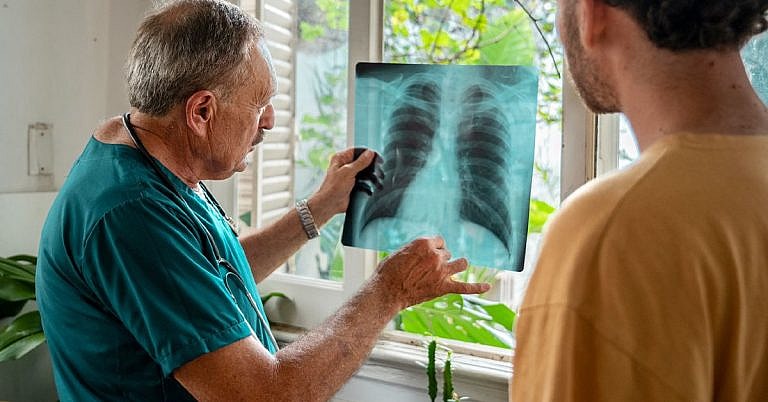What is a pulmonologist?
[trp_language language=”en_US”]
a pulmonologist is a physician who specializes in the respiratory system. From the windpipe to the lungs, if your complaint involves the lungs or any part of the respiratory system, a pulmonologist is the doc you want to solve the problem.
Pulmonology is a medical field of study within internal medicine. These doctors go through the same training as an internist. They receive their degree, complete an internal medicine residency, then several years as a fellow focused primarily on pulmonology and often includes critical care and sleep medicine. After that, they have to take and pass specialty exams, and only then are they able to take patients as a Board-Certified pulmonologists.
While the respiratory system is a specialty in itself, pulmonologists can specialize even further. Some of these doctors focus on certain diseases, like asthma, pulmonary fibrosis, and COPD, while others treat unique demographics, like pediatric patients or geriatric patients.
Because many lung and heart conditions present similar symptoms, pulmonologists often work with cardiologists while diagnosing patients. You’ll also see them frequently in hospital settings. Patients that need life support or manual ventilation to breathe will have a pulmonologist overseeing that element of their care.
How a pulmonologist can help you
A pulmonologist works with patients facing serious or chronic breathing problems. While primary care doctors can handle mild or short-term conditions, such as those caused by a cold or respiratory infection, you’ll need to see a pulmonologist to diagnose, treat and manage more complex illnesses that primarily affect the lungs.
If you’re struggling with respiratory disease, accurate diagnosis is the first step. A pulmonologist uses procedures such as spirometry, bloodwork, chest X-rays, CT scans, bronchoscopies, and sleep studies to diagnose chronic lung disease. Your pulmonologist may ask you to repeat these tests even if you have already completed them to confirm the results.
Once you have a diagnosis, a pulmonologist will create a treatment plan. If you require surgery, that will likely be done by a surgeon who specializes in the heart and lungs. Beyond that, a pulmonologist will use medications, therapies, and pulmonary rehabilitation to help you return to wellness.
Because lung diseases are often debilitating and require long-term care, pulmonologists are well-versed in working with you and your family and healthcare team. They should be able to adapt treatment plans to work with your situation and should be able to coordinate your care with other important members of the team. Examples include respiratory therapists, asthma educators, pulmonary rehab programs, and local support groups such as the American Lung Association’s Better Breathers Clubs. This can help you and your loved ones understand your condition and your path forward.
When should you see a pulmonologist?
A simple cough associated with allergies or cold shouldn’t send you looking for a pulmonary specialist. Urgent care or your primary care doctor should be your first stop, and then on to an allergist or ear, nose, and throat (ENT) specialist.
You should see a pulmonologist if that cough persists for more than 3 weeks, or if it becomes severe. This should be done in consultation with your primary care doctor.
When else should you see a pulmonologist? The below symptoms can be related to a lung condition and a pulmonary specialist may be helpful:
[/trp_language]
[trp_language language=”ar”] [wp_show_posts id=”3185″] [/trp_language]
[trp_language language=”fr_FR”] [wp_show_posts id=”3186″] [/trp_language]
**What is a Pulmonologist?**
**Definition:**
A pulmonologist is a specialized physician who focuses on the diagnosis, treatment, and management of conditions related to the respiratory system. They are also known as respiratory physicians or lung doctors.
**Keyword:** Pulmonologist, Respiratory Physician, Lung Doctor
**Subspecialties:**
* **General Pulmonology:** Diagnosis and treatment of common respiratory conditions such as asthma, chronic obstructive pulmonary disease (COPD), pneumonia, and lung cancer.
* **Interventional Pulmonology:** Procedures such as bronchoscopy, thoracentesis, and pleurodesis for diagnostic and therapeutic purposes.
* **Critical Care Pulmonology:** Management of critically ill patients with respiratory failure and other severe respiratory conditions.
* **Sleep Medicine:** Diagnosis and treatment of sleep disorders such as sleep apnea and insomnia.
**Keyword:** Subspecialty, Respiratory Conditions, Procedures, Sleep Medicine
**Training and Education:**
To become a pulmonologist, physicians typically complete:
* 4 years of medical school
* 3 years of internal medicine residency
* 2-3 years of pulmonology fellowship
**Keywords:** Medical School, Residency, Fellowship
**Role and Responsibilities:**
Pulmonologists play a crucial role in the management of respiratory health. Their responsibilities include:
* Diagnosing and treating respiratory conditions
* Performing diagnostic procedures such as bronchoscopy and chest X-rays
* Prescribing medications and other therapies
* Providing education and counseling to patients
* Collaborating with other healthcare professionals
**Keyword:** Diagnosis, Treatment, Procedures, Education
**When to See a Pulmonologist:**
You should seek consultation with a pulmonologist if you experience persistent or worsening symptoms such as:
* Shortness of breath
* Chest pain
* Coughing
* Wheezing
* Difficulty sleeping
**Keywords:** Symptoms, Consultation
**Conclusion:**
Pulmonologists are highly trained physicians who specialize in the diagnosis, treatment, and management of conditions affecting the respiratory system. They play a vital role in improving respiratory health and providing optimal care to patients with respiratory ailments.








* A pulmonologist is a medical doctor who specializes in the respiratory system. They are trained to diagnose and treat diseases of the lungs, airways, and chest.
* Responsibilities include diagnosing and treating respiratory diseases such as asthma, chronic obstructive pulmonary disease (COPD), and lung infections.rn